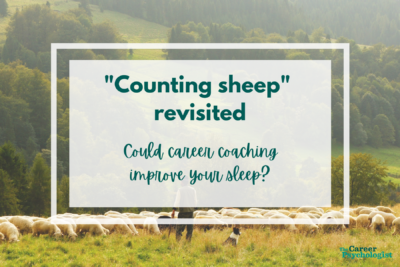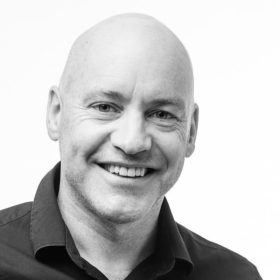
19th Mar 2021
“Counting sheep” revisited: Could career coaching improve your sleep?
I sometimes find it difficult to sleep – every once in a while my mind is too preoccupied, or I’m too hot or too cold, or it’s a full moon or I’ve been binge-watching Netflix, or for no particularly obvious reason I just can’t sleep. I know the Sleep Hygiene drill pretty well, like most of us do – no screens, no bright lights, no caffeine, no alcohol, not too hot, not too cold, etc, etc.
I also tried “Counting Sheep”, the classic distraction technique that involves closing your eyes and imagining a non-stop line of identical sheep hopping over a fence. As I tried to count every sheep jumping over the fence, instead of moving to boredom and sleep, my mind moved into frustration, shame and judgement.
I’ve worked with all kinds of clients from many walks of life and it used to be that when anyone told me they had trouble sleeping, my heart would sink – my mind would tell me that’s too tricky and I’m out of my competency – I’d propose either a course of Cognitive Behaviour Therapy (CBT), or more commonly Acceptance and Commitment Therapy (ACT) but my heart wouldn’t be in it.

So I thought I’d be really clever and revisit “Counting Sheep” by combining it with the classic ACT defusion metaphor “Clouds in the Sky” – the script for this would go something like this: “Give yourself 10 minutes just lying in your bed – noticing any sounds outside the room, then with kindness bringing your attention to the sounds in the room, and eventually resting your attention on your breath. Imagine as each sheep jumps the gate it floats off as if it’s a sheep-shaped cloud in the sky where it’s floating with countless other sheep-shaped clouds, all drifting through the blue sky. Try to notice your thoughts from a place of curiosity, without judging them, and each time you notice a thought, imagine it pops onto the fleece of a sheep-shaped clouds. Then imagine how the wind makes the clouds float away at different speeds taking your thoughts with them. Keep your awareness on the sheep-shaped clouds rather than the thoughts inside them. Continue to imagine every new thought popping on a sheep-shaped cloud and floating away in the sky. Breathe deeply into each cloud and notice your body getting heavy as you breath deeply and start to feel sleepy”.
Yet this approach didn’t work very well for me, so there’s no way I’d suggest it to my clients. The more I thought about it, those kinds of classic ACT defusion exercises like “Leaves on a Stream” never really worked for me anyway!
So I read more widely, and when I encountered any resources about how to “do” ACT for insomnia my heart would sink even further. Then I’d read articles inviting me to “do nothing” (https://stevenchayes.com/
So I gave up trying to work with my clients’ insomnia. I explained to them that I’m not an insomnia expert and I’m not even a sleep expert – in fact I’m pretty bad at sleeping at times myself. I referred clients presenting with severe sleep issues to other psychologists. I’d also suggest some websites for them to have a look at (e.g. The Sleep School – https://www.thesleepschool.
For clients who choose to remain with me at The Career Psychologist, I help them to ’normalise’ sleep issues by (e.g. citing the recent BUPA Global Executive Wellbeing Index, which states that 22% of senior executives around the world have suffered disturbed sleep in the past 12 months https://www.bupa.com/~/
Then, instead of focusing my attention on sleep (or even sheep-shaped clouds), I work closely with my clients – including those experiencing insomnia – to find meaning and purpose in all their waking hours. At The Career Psychologist we use ACT, Positive Psychology and Marginal Gains Theory to gently orientate our clients towards living their life according to their values, in a way that works for them. Typically this means making small behavioural changes that allow our clients to get more out of their working day, engage more fully with their colleagues, friends and family, curtail some of their unhelpful behaviours, and think more clearly about their career direction. It’s not uncommon for those clients presenting with insomnia to even report significant improvements, without any major focus on sleep interventions at all.
Now, I’m not trying to suggest that sleep therapy isn’t effective, as I know it works for many people worldwide and there is good evidence to support it. But if you’re feeling stuck in your career, maybe focusing on being the person you want to be at work (and in your private life) could bring much needed clarity and direction (which might just help you sleep a little more easily).
https://www.
Dr Mick Darby (Psychol) is a Counselling, Coaching and Business Psychologist working with The Career Psychologist.

Tags: Anxiety, Behaviour analysis in coaching, Behaviour change, cognitive fusion, Creative thinking, Dealing with difficult thoughts and emotions, Energy management, Mindfulness, Positive psychology
Subscribe to the blog
What we’ve been writing about
The Getting Unstuck process steps
Latest Tweets
-
 A thought provoking read from our own Naomi de Barra about mobile phones and how they, in her experience, disrupted… https://t.co/4SzhT2lWj0
A thought provoking read from our own Naomi de Barra about mobile phones and how they, in her experience, disrupted… https://t.co/4SzhT2lWj0
-
 On #WorldMentalHealthDay , like every other day, take a moment to look after yourself and your wellness "If you d… https://t.co/326PA9fVYh
On #WorldMentalHealthDay , like every other day, take a moment to look after yourself and your wellness "If you d… https://t.co/326PA9fVYh
-
 We'd love to hear what books or items improve your mental health & wellbeing? Here are 3 of ours: 1. The Happine… https://t.co/mtXyNlg6nk
We'd love to hear what books or items improve your mental health & wellbeing? Here are 3 of ours: 1. The Happine… https://t.co/mtXyNlg6nk

